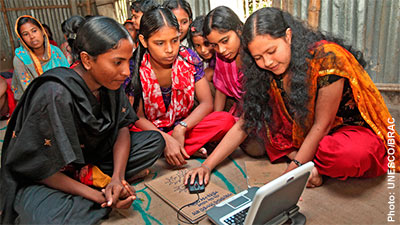Girls’ Education and Gender Equality

This project is funded under the DFID Education Rigorous Literature Review programme.
The reviews identify critical evidence gaps to guide future research programmes and present existing evidence for the development of effective interventions.
The team
Elaine Unterhalter, Director (Institute of Education, University of London),
Amy North (Institute of Education, University of London),
Madeleine Arnot (University of Cambridge),
Cynthia Lloyd (Independent Consultant),
Lebo Moletsane (University of KwaZulu Natal),
Erin Murphy-Graham (University of California, Berkeley),
Jenny Parkes (Institute of Education, University of London),
Mioko Saito (IIEP).
The research question
The central research question this review set out to investigate concerns the kind of interventions that research evidence suggests can lead to an expansion and improvement in girls’ education. It also considered evidence on the relationship between an expansion and improvement in girls’ education and a deepening of gender equality.
A Theory of Change
A Theory of Change (Toc) was developed for the review. The ToC drew on the understanding that girls’ education and gender equality are affected by processes within and beyond schools. It is therefore hypothesised that the development and implementation of interventions to improve girls’ schooling and enhance gender equality are affected by aspects of context at local, national and global levels. These include the level or extent of a climate of support for girls’ schooling, the existence of complementary legal and regulatory frameworks, and state capacity to implement policy and engage the widest range of stakeholders in inclusive dialogue.
The types of intervention
The ToC distinguished between three kinds of interventions, although it was acknowledged that sometimes a single intervention had overlapping concerns. These were:
- Interventions which focus on resources and infrastructure
- Interventions which focus on changing institutions
- Interventions which focus on changing norms and including the most marginalized in education decision making
While each kind of intervention can have a positive impact on improving girls’ participation in school, on the quality of education they receive, and on the extent to which that education is empowering to them, the hypotheses was that their impact will be greatest when a combination of different kinds of interventions come together, and when adequate attention is paid to the context within which they occur. The ToC was thus developed as a multi-level model to enable an examination of the relationships between context, different forms of interventions, outputs relating to girls’ education, and broader gender equality outcomes.
In order to examine evidence relating to the different nodes of the ToC, a total of 169 research studies published since 1991 were reviewed.
Research Publications
Unterhalter E, North A, Arnot M, Lloyd C, Moletsane L, Murphy-Graham E, Parkes J, Saito M (2014) Interventions to enhance girls’ education and gender equality: Education Rigorous Literature Review. (Department for International Development).
Unterhalter E, North A, Arnot M, Lloyd C, Moletsane L, Murphy-Graham E, Parkes J, Saito M (2014) Interventions to enhance girls’ education and gender equality: Evidence Brief. Education Rigorous Literature Review. (Department for International Development).
